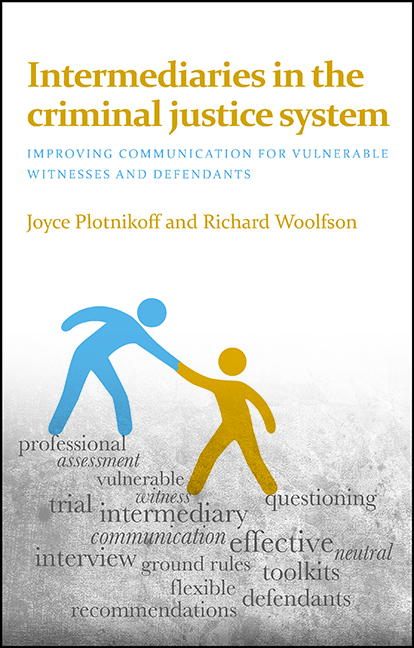 Intermediaries in the Criminal Justice System
Intermediaries in the Criminal Justice System Book contents
- Frontmatter
- Contents
- About the authors
- The Nuffield Foundation
- Acknowledgements
- Foreword
- one Introduction: a fresh pair of eyes
- two The intermediary scheme in England and Wales
- three Behind the scenes: planning to assess the witness
- four Assessment methods and involvement of the interviewer
- five Communication aids and stress reduction strategies
- six Contributing to the effectiveness of the police interview
- seven Negotiating professional space at the ground rules hearing
- eight Making the ground rules hearing effective
- nine ‘Every reasonable step’: preparation for giving evidence
- ten Cross-examination: research, case law, training and regulation
- eleven Cross-examination: intervention at trial
- twelve Cross-examination: challenges at the cutting edge
- thirteen The uneasy position of vulnerable defendants
- fourteen A new profession
- fifteen Conclusion
- References
- Index
- Table of cases
- Legislation
- Rules
- Practice directions
nine - ‘Every reasonable step’: preparation for giving evidence
Published online by Cambridge University Press: 08 March 2022
- Frontmatter
- Contents
- About the authors
- The Nuffield Foundation
- Acknowledgements
- Foreword
- one Introduction: a fresh pair of eyes
- two The intermediary scheme in England and Wales
- three Behind the scenes: planning to assess the witness
- four Assessment methods and involvement of the interviewer
- five Communication aids and stress reduction strategies
- six Contributing to the effectiveness of the police interview
- seven Negotiating professional space at the ground rules hearing
- eight Making the ground rules hearing effective
- nine ‘Every reasonable step’: preparation for giving evidence
- ten Cross-examination: research, case law, training and regulation
- eleven Cross-examination: intervention at trial
- twelve Cross-examination: challenges at the cutting edge
- thirteen The uneasy position of vulnerable defendants
- fourteen A new profession
- fifteen Conclusion
- References
- Index
- Table of cases
- Legislation
- Rules
- Practice directions
Summary
In preparation for trial, courts are expected to take ‘every reasonable step’ to facilitate the participation of a witness or defendant, including giving directions for the appropriate treatment of the person, especially in intermediary cases (Criminal Procedure Rules 3.9(3)(b) and 3.9(6), 2015; Criminal Practice Direction 3D2, 2015). Intermediaries have become adept at turning this exhortation into practice in a variety of creative ways.
This chapter describes intermediaries’ involvement in the witness’s pre-trial familiarisation visit to the court; how they help ensure witnesses make an informed choice about how to give evidence and refresh their memories from their police statements; why intermediaries may recommend face-to-face questioning in the live link room; how they facilitate witness introductions to the judge and advocates; and how they collaborate with the Witness Service and Witness Care Units. The chapter concludes with examples of innovative intermediary recommendations which have helped maximise best evidence from vulnerable people.
Pre-trial familiarisation visits
‘I was scared about it until I went to look round and then it made me feel more comfortable.’ (14-year-old witness, in Plotnikoff and Woolfson, 2009a)
The Witness Charter entitles all witnesses to visit the court before trial (Ministry of Justice, 2013b, Standard 11). They and their families almost always find this helps to demystify the trial process and allay anxieties. Visits are usually conducted by the Witness Service, available to both prosecution and defence witnesses and staffed in every court by a paid manager and a team of trained volunteer supporters. (Citizens Advice took over management of the Witness Service from Victim Support in 2015.) Eight locations also benefit from a specialist Young Witness Service which continues to be managed by Victim Support.
Where staff schedules permit, witnesses can meet the supporter and the court usher whom they will see at trial. Sometimes pre-trial visits are not offered or witnesses fail to follow up. Intermediaries are usually proactive in arranging visits and are expected to accompany the witness. Their presence assists in facilitating communication between witnesses, supporters and court staff. Visits also give intermediaries the opportunity to see the court as the witness sees it, as Jeeves describes:
‘The family of N, a young man on the autism spectrum, was anxious about him being a witness and delayed telling him that he’d be going to court. The court had an excellent Witness Service. We worked together to demonstrate our mutual roles.
- Type
- Chapter
- Information
- Intermediaries in the Criminal Justice SystemImproving Communication for Vulnerable Witnesses and Defendants, pp. 129 - 154Publisher: Bristol University PressPrint publication year: 2015


